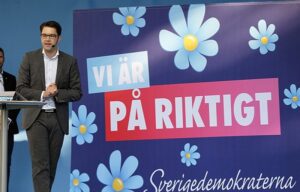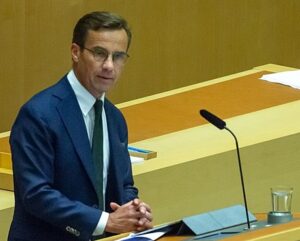Analysis from our member organisation “Center for Marxist Social Studies” in Sweden for the European Elections.
From a Swedish perspective, the upcoming elections for the European parliament are defined by the end of an unusually complicated government formation process. While the formation of a government in Sweden usually takes no more than a couple of days, this time lasted from the national elections on the 9th September last year until the 18th of January of 2019. The final outcome of this process was a rupture with the traditional Swedish political logic, defined two major blocks – one right-wing (the so-called Alliance) centered around the conservative-liberal Moderate party (M), and one red-green block centered around the Social Democratic Labour Party (SAP).
Due to a general shift in the vote, away from these two traditional major parties towards the extreme right-wing of the Sweden Democrats (SD), as well as the agrarian-liberal Center Party (C) and the socialist Left party (V), neither of these blocks managed to secure a majority for a ruling coalition. After months of deliberations, the final outcome was a centrist coalition built around the Center party, the Liberal party, the Green party and with the SAP as the major coalition partner. The coalition, problematically not least for the SAP, has promised to push through a mostly ’liberalizing’ agenda on, which by all accounts has little support amongst the general electorate, while naturally alienating working-class voters from Social democracy. On the other hand, the formation of this coalition has rightly been seen as a major set back for the traditional right-wing, which has lost most of its traditional political partners, and been forced into a highly problematic game of political strategizing, involving the far-right Sweden democrats, to be able to offer the semblance of an alternative.
Beyond the migration debate
This shift has made the Swedish political landscape less predictable in general. Concomitantly there seems to have occurred a shift in the discourse leading up to the European parliamentary elections. As in most if not all, member states, the dominating topics ahead of the European Parliamentary elections was generally projected to be those connected to a rising tide of the the extreme right, such as immigration and connected dog-whistle politics. While these issues are naturally still evident in many ways, such as the heavy focus on issues of law and order from the newly formed ”national-conservative” block – i.e. informally grouping together the traditional right-wing Moderate and Christian Democratic parties with the extreme right-wing of the SD – they seem to have receded relatively speaking.
Several reasons might account for this. Firstly, the issue of migration, which dominated the political discussion for a number of years, might be suffering from a general media fatigue, as well as the perception that it has been ”solved”, whatever the individual might read into such a description. Secondly, it seems that the Sweden Democrats – despite having one of the most problematic provenances and basis of all European right-wing extremist parties, springing as they do directly out of an explicitly neo-nazi movement and milieu – has deemed it important to not associate themselves to closely with its more successful sister parties around the continent, such as Fidesz, Lega, FPÖ etc.
Arguably this is a tacit acknowledgement that, despite the clear breakthrough of the SD in the opinion over the last last couple of years, the process of ’normalization’ which the party has so highly desired and sought is still not regarded as non-reversible or fully concluded. An association with parties that are, from a Swedish horizon, perceived as more radical might then be unwelcome. Following this, on the other hand, the discourse around the formation of a new, more or less unified, European far-right movement, which has been such a central aspect of the election campaigns around Europe, has in Sweden mostly been brought up in negative terms: as something that no Swedish movement or party really wants to associate itself with, and in the form of attempts from V and others of associating the reactionary policies of Orban et al with the SD.
Climate change and waning resistance to the country’s EU membership
Taken together, it seems then that traditional far-right and/or conservative issues have taken a back seat, marking perhaps an opportunity for progressive, green and left parties to dominate the discourse more than was expected.
Most central of these other issues has been those of the environment and climate change. This is partly because the EU is traditionally understood, from a Swedish perspective, as having one of its central roles to play precisely on these topics, and partly because of the emergence of the youth movement and strikes against climate change – centered around Greta Thunberg – during the last couple of months. It should also be noted that a series of unprecedented large scale forest fires and as well as recurring threats of water scarcity has hit Sweden heavily during the last years, raising awareness of the issue of climate change in broader society.
Concerning the V – The Left Party – the major Swedish socialist party to the left of the SAP – it has positioned itself strongly on environmental issues ahead of the EP elections, aiming to capture the momentum of a continuously radicalised movement, which does not seem to be content with traditional ”green” (i.e. social-liberal reformist-capitalist) solutions. Besides offering a socialist position on climate change, the Left party has focused heavily on issues of labour rights and overcoming potential conflicts between domestic and migrant labour, by pushing for regulations of the labour market and the strengthening of the position of unions, while defending the rights of refugees and migrant labour. The project of European Pillar of Social Rights has also been put at the forefront of the Swedish debate, since it is strongly opposed by all parties on the right, whilst supported by V, the Greens and the SAP.
Last but not least, defence of women’s rights and abortion rights have been given much focus by V. These are seen as under threat on a European level, and have a very strong resonance with the overwhelming majority of the Swedish electorate. V’s MEP Malin Björk also has a high visibility and credibility on these issues.
Perhaps the most important shift in terms of its long-term effects – and also a matter of much controversy –has been the decision taken by V to put the demand for a withdrawal from the EU on the back-burner. The Swedish left broadly has historically been highly skeptical of the EU, and this decision has sparked considerable debate within and around the party. To explain the background, it is central to look at three things: firstly, the catastrophic situation of the Brexit negotiations – which of course makes any plan for withdrawal look less appealing, secondly, the general right-wing, xenophobic hegemony on the question of anti-EU sentiment today, and thirdly the historically high support for remaining in the EU within the Swedish electorate.
It is far too early to say whether or not this decision it will be reversed in the near future: the Left party still advocates eventually leaving the EU, and no formal change of policy has been made, and the issue is highly controversial internally. Regardless, attempts by fringe left parties to capitalise on a left-resistance to the EU do not seem to have any chances of success.
Prospective results
Swedish elections for the European Parliament traditionally benefit certain parties – mostly smaller parties such as the Green party and other parties with a specific profile perceived more relevant on the European level – while the results are usually weaker for the traditional major parties. Apart from the fact that certain topics seem to simply ’match’ better with peoples perception of what is relevant to the European Union, this is surely also the effect of relatively low voter turnout – benefiting parties that go better with more educated and urban voters. In the last European election turnout was 51%, which was a marked increase from earlier numbers below 40% but still extremely low by Swedish standards (the national elections last year saw a turnout of 87%, which is about average).
 For the Left party, which has recently seen an upturn in support on the national level, since becoming the sole left opposition to the centrist government, the results are expected to be good. Opinion polls so far promise a doubling of the support, from 5,6% to above 10% – which would result in at least on more MEP representing the Left. Whether or not this will be the final results, and there is still hope of an even better showing, not least given the uncertainties concerning turnout, is far from certain, but all in all it seems clear that the left will do well.
For the Left party, which has recently seen an upturn in support on the national level, since becoming the sole left opposition to the centrist government, the results are expected to be good. Opinion polls so far promise a doubling of the support, from 5,6% to above 10% – which would result in at least on more MEP representing the Left. Whether or not this will be the final results, and there is still hope of an even better showing, not least given the uncertainties concerning turnout, is far from certain, but all in all it seems clear that the left will do well.
Cover photo: electoral campaign of the Left Party (Vänsterpartiet) in Sweden. Source: fb Vänsterpartiet.



